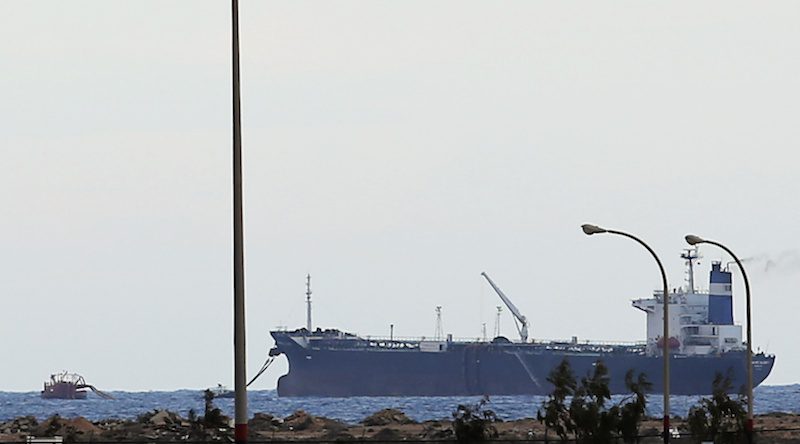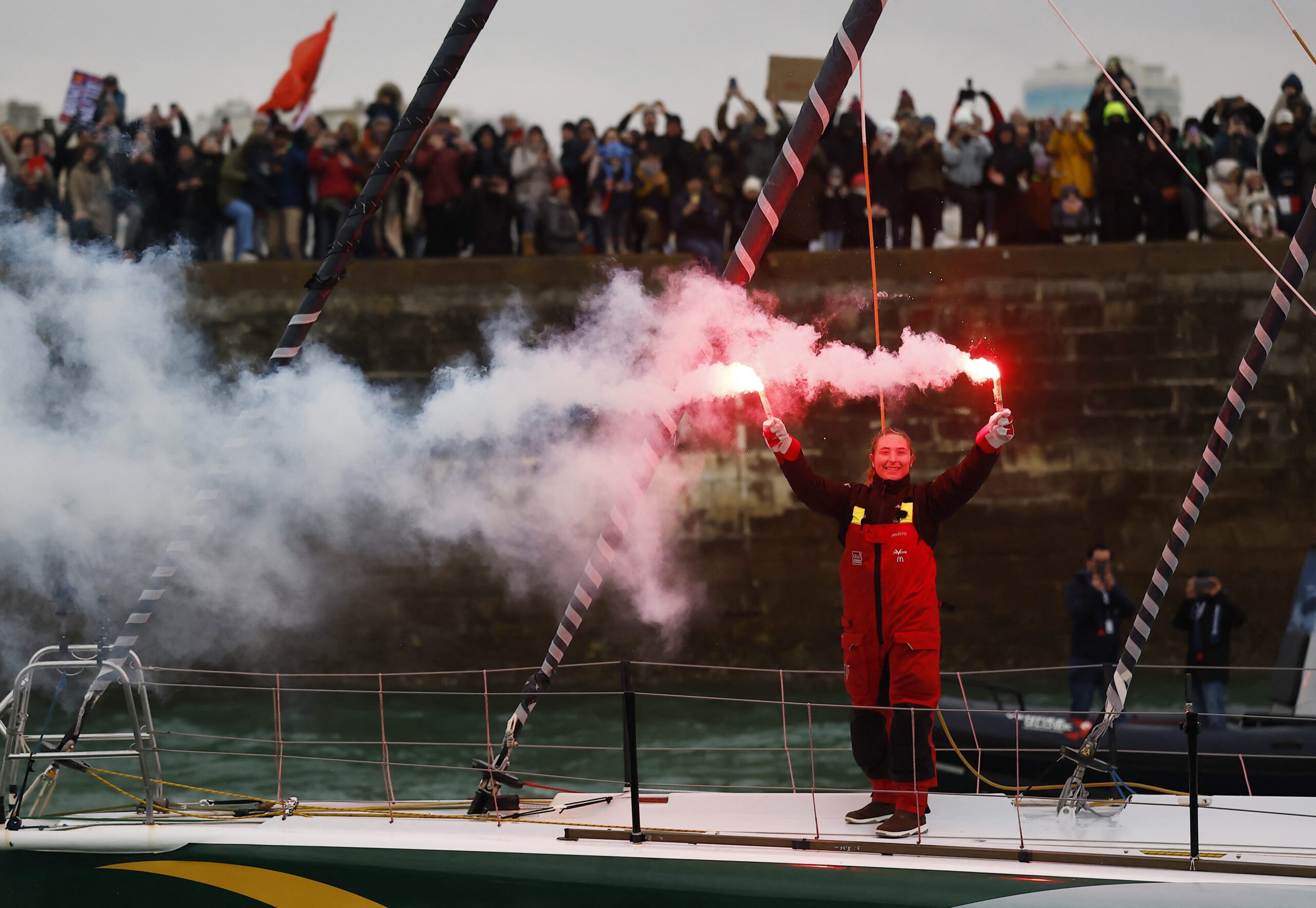The Morning Glory tanker docked at the Es Sider export terminal in Ras Lanuf March 8, 2014. Libya threatened on Saturday to bomb the ship if it tried to ship oil from a rebel-controlled port. REUTERS/Esam Omran Al-Fetori
 By Feras Bosalum and Ulf Laessing
By Feras Bosalum and Ulf Laessing
TRIPOLI, March 17 (Reuters) – U.S. special forces have seized a commercial tanker that fled with a cargo of oil from a Libyan port controlled by anti-government rebels, halting their attempt to sell petroleum on the global market.
Libyan federalist gunmen demanding regional autonomy and a share of oil wealth managed to load crude onto the ship, which escaped Libya’s navy, embarrassing Tripoli’s government and prompting parliament to sack the prime minister.
U.S. Navy SEALs stormed the Morning Glory tanker as it sat in international waters off Cyprus on Sunday night and took control of the vessel, which the Pentagon said had been held by three armed Libyans.
The standoff over control of OPEC member Libya’s oil illustrates how fragile the North African nation’s stability remains since the NATO-backed civil war that led to the fall of Muammar Gaddafi nearly three years ago.
With its army still nascent, a weak government has been unable to impose its will on former anti-Gaddafi fighters and militias who now use their military muscle to make demands on the state, often by targeting the vital oil sector.
At least in the short term, the tanker’s seizure by U.S. forces is likely to prevent any more attempted oil sales by the rebels, who in August took control of three export terminals accounting previously for 700,000 barrels a day of exports.
“Oil is the economy’s artery. The government will not allow anyone to fool around with the assets and resources of the Libyan people,” the Libyan government said in a statement.
No one was hurt in the tanker raid, which was approved by U.S. President Barack Obama and requested by the Libyan and Cypriot governments, Pentagon Press Secretary John Kirby said.
“The Morning Glory is carrying a cargo of oil owned by the Libyan government National Oil Company. The ship and its cargo were illicitly obtained” from the Libyan port of Es Sider, his statement said.
It was the second time in six months that U.S. forces have become involved in Libya. A commando team snatched a suspected al Qaeda suspect off the street as he returned home from prayers in the capital Tripoli in September.
The Cypriot foreign ministry said the vessel was now heading west in the Mediterranean with a U.S. military escort. It was parked 18 miles (29 km) southwest of Cyprus when the operation occurred around midnight Cyprus time.
The Morning Glory had been North Korean-flagged, but the government in Pyongyang on Thursday said it had notified Libya and maritime authorities that it had severed all ties with the ship because of the vessel’s contraband cargo.
There was no immediate reaction from the federalist rebels, based in eastern Libya.
Abb-Rabbo al-Barassi, self-declared prime minister of the rebel movement, said on Saturday his group was ready to negotiate an end to the port blockade, but the government needed to abandon plans to mount a military offensive.
Libya’s parliament head, who has quasi-presidential powers, had given the rebels two weeks to withdraw from the seized ports or face a military operation.
But analysts said it was uncertain whether government troops would be able effectively to confront the heavily armed rebels, made up of soldiers who defected from an oil protection force.
BOOST FOR LIBYA GOVT
The tanker’s escape highlighted the weakness of government forces, which had claimed several times that the 37,000-tonne ship was under their control only for the vessel to slip into international waters after a firefight.
Still, the intervention by U.S. forces gives a boost to the fragile Libyan government in its fight to impose order on the vast North African state, whose transition to democracy has been upset by tribal, regional and political disputes.
Western powers, worried that the country might fracture or slide deeper into chaos, have been training Libyan armed forces and cajoling conflicting parties in government to reach a settlement, with little progress so far.
A successful sale of Libyan oil outside government control, though, was always going to be complicated for the rebels.
A Cypriot police source said three men – described as two Israelis and a Senegalese – were detained for questioning on Saturday on suspicion of attempting to buy the tanker’s cargo, but were freed after a court refused to issue an arrest warrant.
Two of the men carried diplomatic passports – one from Senegal and one from a central African country, the security source said.
The source said they flew a Lear Jet into Cyprus on Friday evening, chartered a vessel from a yachting marina in Larnaca and headed to the tanker.
“They spoke to somebody on board the vessel, then left. At Larnaca marina police called them in for questioning,” the source said. The men left for Tel Aviv after being freed.
FULL CONFRONTATION UNLIKELY
The Libyan navy did open fire on a Maltese-flagged tanker trying to approach Es Sider in January, but analysts say a full military confrontation with the port rebels would be unlikely.
Any bloodshed would complicate efforts to negotiate a settlement with rebel leader Ibrahim Jathran, a former anti-Gaddafi commander who was in charge of protecting oilfields and ports until he turned against the government in the summer.
His campaign to seek more rights for Libya’s underdeveloped east has won him some sympathy, but many people dismiss him as a tribal warlord with no political vision.
Any military conflict might boost his popularity and plans to establish a federalist state sharing power and oil wealth like under King Idris, who was toppled by Gaddafi in a 1969 plot.
The government fears federalism might open the door for secession and similar protests by other regions though the rebels say they do not want to break up Libya.
Libya’s government faces a budget crisis as oil production has fallen to little over 200,000 barrels per day (bpd), from 1.4 million bpd in summer when a wave of protests at oilfields and ports started. Oil is the main source of revenues for the budget and to fund basic food imports. (Additional reporting by Chris Michaud, Feras Bosalum, Michele Kambas and Patrick Markey; Editing by Dale Hudson)
© 2014 Thomson Reuters. All rights reserved.

 Join The Club
Join The Club











